New research by the COVID Symptom Study team has identified at least three ‘types’ of long COVID in people who experience symptoms for at least 12 weeks. The study, pre-printed on medrXiv, also identifies patterns of symptoms among people infected with the wild-type variant, delta and alpha, among vaccinated and unvaccinated individuals.
The researchers analysed data of 1,459 individuals with post-Covid syndrome (where someone reports ongoing symptoms for longer than 84 days) from the ZOE COVID Symptoms Study app. This study included data from our 2021 long COVID questionnaire completed by CSS Biobank volunteers.

People with symptoms for 12 weeks or more fell into three groups based on the types of symptoms they were experiencing. The largest group was characterised by a cluster of neurological symptoms such as fatigue, brain fog and headache and was the most common subtype among SARS-CoV-2 alpha and delta variants. A second group experienced chest symptoms including chest pain and severe shortness of breath, which could point to lung damage. This was the largest cluster in the wild-type period when the population was unvaccinated. Finally, there were some people who experienced a diverse range of symptoms including palpitations, muscle aches and pains, and changes in their skin and hair.
While these three subtypes were evident in all variants, additional symptom clusters were also identified which were subtly different between variants. These differences may not be due to variants themselves, but other factors which have changed across the pandemic, such as time of year, social behaviours, and treatments.
The data also suggests that the symptom types for people who did experience symptoms for 12 weeks or more were similar in vaccinated and unvaccinated people at least with variants which had these data. We know from existing data that the risk of long-COVID overall is reduced by vaccination.
The study shows that post-COVID syndrome is not just one condition and the findings can inform the development of personalised diagnosis and management.








